The custodial deaths of a father-son duo in Tamil Nadu have caught national attention. While custodial deaths & police behaviour are once again under spotlight, data reveals a very worrying trend. No police personnel were convicted for custodial deaths between 2014 & 2018.
Recently, in Tuticorin (Tamil Nadu), a father and son were allegedly killed due to brutality inflicted up on them by the police. The news has sparked outrage in social media, with even celebrities and politicians demanding justice. The incident came into light and gained attention through an RJ’s Instagram post.
Sattankulam police had filed FIR on 19 June 2020 against the father-son duo under IPC 188, 269, 294(b), 353, and 506 (2)- for disobeying public order and for abusing police officers. The complaint was filed by the head constable stating that the father and son had kept their shop open beyond the curfew time due to COVID-19. According to the FIR filed by the police, when the police warned them to close the shop during the patrol, they verbally abused the police and ‘rolled on the ground injuring themselves’ following which they were taken to the station and the FIR was filed.
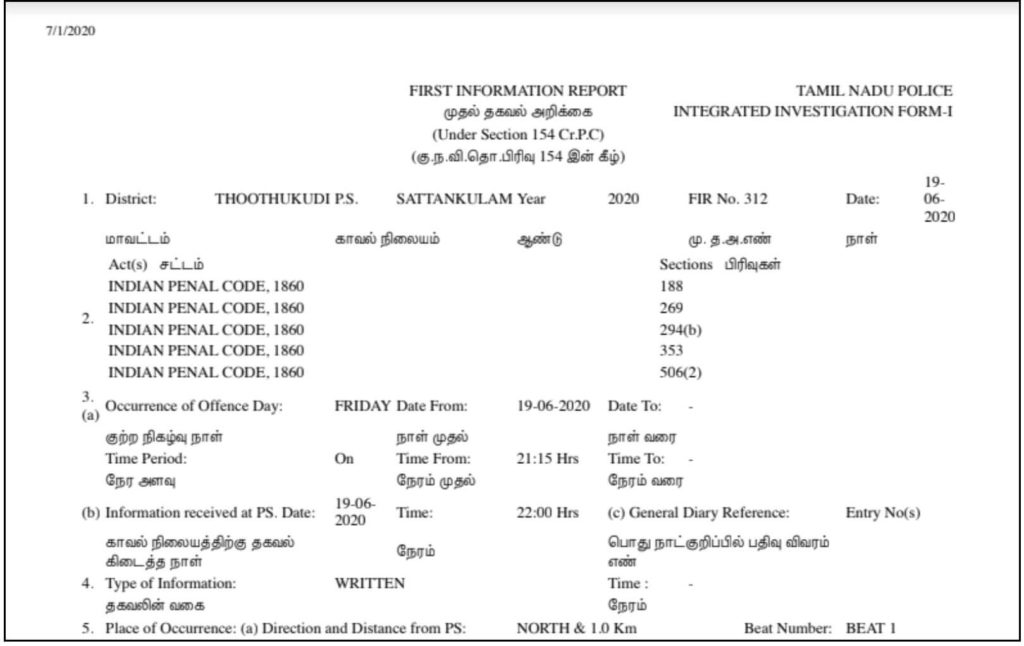
However, the kin of the deceased stated that the men were subjected to brutal torture. The Madurai bench of the Madras High Court, satisfied with the prima facie evidence – a female constable’s statement, medical report, and judicial magistrate’s report, directed that the case be taken over by the CB-CID before the CBI takes over.
This is not the first time that the police have been under the scanner for custodial torture & brutality. During the nation-wide lockdown, several videos of police attacking migrants and street vendors have surfaced on social media, raising questions on the conduct of police.
Data on Custodial deaths is published by the NCRB
The National Crime Records Bureau (NCRB) publishes data on the number of deaths that take place in police custody each year, along with reasons, in the annual Crimes in India publication. The latest report is that of 2018.
Between 2001 to 2018, a total of 1,727 persons have died in police custody including those in judicial remand and those who have been arrested but not yet produced before the court. On average, 96 persons in custody have lost their lives annually. In 2010 and 2018, the number was lowest at 70, while 2005 reported the highest number of such cases at 128 in these 18 years. In the last five years, between 2014 to 2018, 452 persons had lost their lives, accounting for 26% of such deaths in 18 years.
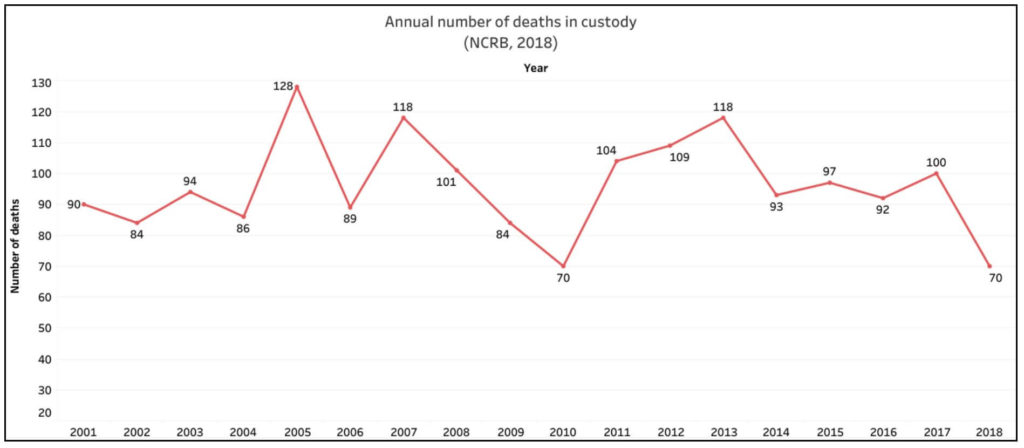
7 states account for 69% of Custodial deaths
State wise data reveals that in the five years between 2014 and 2018, Maharashtra (78), Andhra Pradesh (70), and Gujarat (52), reported more than 50 deaths each. While Tamil Nadu reported 35 deaths, Uttar Pradesh, and Madhya Pradesh reported 30 each during this period. These seven states alone accounted for 69% of the custodial deaths reported in India between 2014 & 2018. A closer look at the data reveals that the number of deaths reported by Maharashtra and Andhra Pradesh in 2018 alone was much higher than the total deaths reported by 23 states in all these five years.
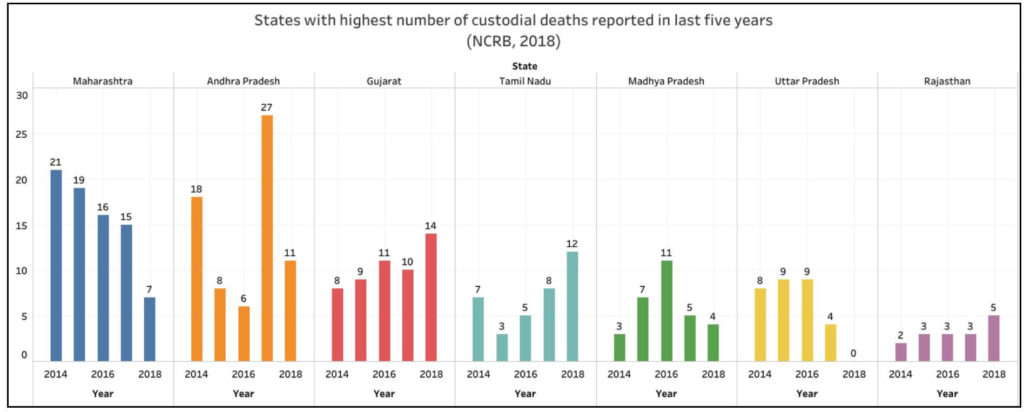
Zero police personnel were convicted in five years
While 452 deaths were reported in custody between 2014 to 2018, only 192 cases were registered during this period, and 118 policemen were charge sheeted. No police personnel were convicted during this period. Numbers show that in the 18 years between 2001 & 2018, only 810 cases were registered, 334 charge sheeted, and only 26 police personnel were convicted.
Among the seven states mentioned earlier, 4 police personnel were convicted in Madhya Pradesh while 17 were convicted in Uttar Pradesh in the 18-year period. In addition to these, Chhattisgarh reported four convictions and Odisha reported one. Maharashtra, Andhra Pradesh, Gujarat, Tamil Nadu, and Rajasthan had zero convictions of police personnel despite the large number of custodial deaths & cases.
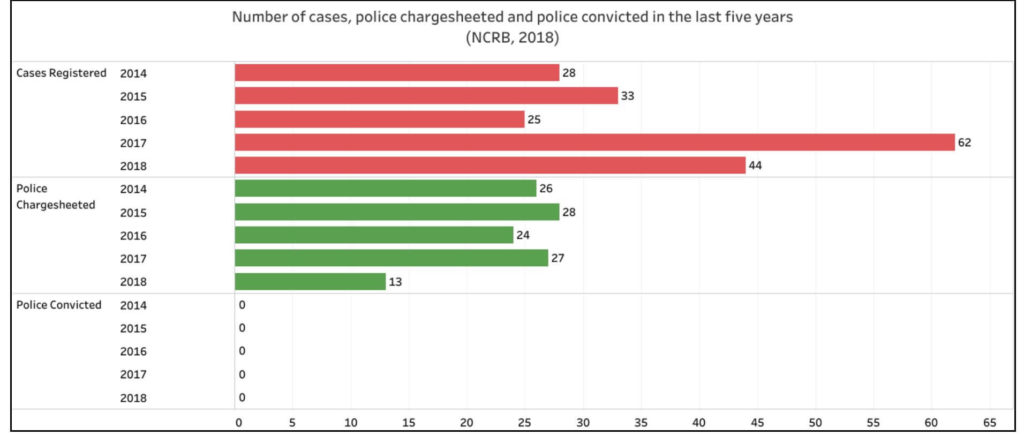
31 Custodial deaths between 2014 & 2018 because of Police assault
In the five years under consideration (2014-2018), 153 persons which is one-third of all custodial deaths had died due to suicide. Illness was the reason recorded behind the deaths of 22.5% (102 persons). Physical assault by police induced injuries had resulted in the deaths of 31 persons, around 7%.
In 2014, 10% of the deaths were due to the injuries caused by physical assault of the police. In the subsequent years, 6% in 2015, 9% in 2016, 5% in 2017, and 4% deaths in 2018 were reported to have taken place due to the same reason.
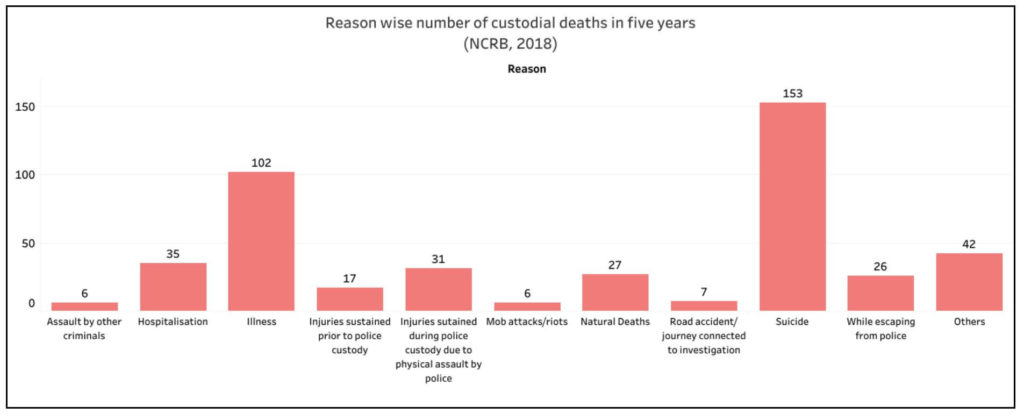
More than 5000 cases were registered against police personnel in 2018
Furthermore, in 2018 alone, a total of 5,479 cases were registered against police personnel. 89 cases of human rights violation were registered against police personnel in the same year. This included 4 cases of encounter killing, 17 extortion cases, 3 cases of torture, 3 deaths in custody and 1 for illegal detention. Besides, cases of rape, atrocities on SC and ST, and offences against children have also been reported to have been committed by police in the past.
The major functions of the Police are to maintain public order and safety, law enforcement, and prevention, investigation, and detection of criminal activities. While they exercise their duty, it is also important that they behave with due courtesy and decorum with the public, especially senior citizens, women, and children. This comes under the social responsibilities of the police as per the Model Police Act, 2006. The Police is a state subject under the seventh schedule.
Procedures & rules to be followed while arresting a person
Police officers cannot beat a person, intimidate, slap, or threaten them. This is against the law and the police officer can be punished. As per the guidelines on effective police custody management, a person can be detained only on valid and reasonable grounds for a minimum period of time. Likewise, there are many other rights a person can exercise, when under arrest or detention. As everyone is aware of these rules, it is mandatory that the procedures and requirements that need to be followed during the arrest, detention, and interrogation of a person, known as D K Basu guidelines, have to be displayed on the notice boards of all police stations, and chowkis.
NHRC has issued guidelines to report custodial deaths
In cases of custodial deaths, the National Human Rights Commission has issued guidelines. Every case of custodial death and rape has to be informed to NHRC within 24 hours of occurrence. Various reports including the inquest, post-mortem, videography of post-mortem, and magisterial inquiry report needs to be submitted as well for ascertaining foul play or negligence, if any, that caused the death. The commission has also prescribed a format for reporting. Magisterial enquiry should also be conducted at the earliest. The enquiry magistrate must visit the crime scene, identify and record statements of witnesses, and collect relevant information such as circumstances of death, manner and sequence of events, and cause of death.
Rules & Guidelines do not come to the rescue of victims
In spite of there being so many guidelines and laws to safeguard human rights, there are several cases of custodial deaths and police brutality. Zero convictions for custodial deaths between 2014 & 2018 is a matter of great concern. On top of that, zero convictions in many states for many years is deeply worrying.
All these expose the serious flaws in the system and call for urgent reforms in police. Though there are many attempts at image makeover of the police and make them people friendly, the issues of custodial deaths, rapes, torture, etc. put a serious on all such attempts. The latest case in Tamil Nadu will be closely watched for it is time the judicial process brings the perpetrators to book.
Featured Image: Custodial deaths


